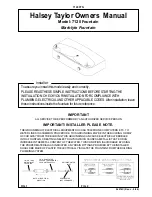
4
Keep the appliance area clear and free from
combustible materials, gasoline, and other
flammable vapors and liquids.
Solid fuels should not be burned in this gas
appliance.
Inspect the hose before each use of the appliance.
The hose assembly must be replaced prior to the
appliance being put into operation if there is
evidence of excessive abrasion, wear, or if the
hose is damaged. The replacement hose assembly
is specified in this manual.
The burner must be inspected before each use.
The burner must be replaced prior to the appliance
being put into operation if it is evident that the
burner is damaged. The replacement burner is
specified in this manual.
The burner should always be cleaned:
Disconnect it from the appliance, use a cleaner to
remove blockages attached on the ports, and drain
the blockages from the gas inlet. A high pressured
stream of water may also be used.
Do not use this appliance if any part has been
under water. Immediately call a qualified service
technician to inspect the appliance and to replace
any part of the control system and any gas
control that has been under water.
This appliance is for outdoor use only in a
well-ventilated space and should not be used in
a building, garage, or any other enclosed area.
Other cylinders may be acceptable for use with the
appliance provided that they are compatible with the
appliance retention means and accompanied by
illustration(s) depicting the cylinder mounted to the
appliance utilizing the cylinder retention means and
the point of contact between the cylinder and the
retention means. The cylinder should be 12 inches
in diameter and 18 inches high. The capacity is
20lbs of propane.
If the appliance is not in use, the gas must be turned
off at the supply cylinder.
Storage of an appliance indoors is permissible only
if the cylinder is disconnected and removed from the
appliance.
Cylinders must be stored outdoors in a well-ventilated
area and out of children’s reach.
Disconnected cylinders must have a dust cap
secured at the end of the valve and cannot be stored
in a building, garage, or any other enclosed area.
The pressure regulator and hose assembly supplied
with this appliance must be used. Replacement
pressure regulators and hose assemblies must be
the ones specified in this manual.
The cylinder supply system must be arranged for
vapor withdrawal.
The cylinder used must include a collar to protect
the cylinder valve.
The Procedure for Checking for Gas Leaks:
Never test for leaks with a flame. Prior to first use, at
the beginning of each season, or every time your LP
gas tank is changed, you must check for gas leaks.
Follow these three steps:
1. Make a soap solution by mixing one part liquid
detergent and one part water.
2. Make sure that the burner is off and then turn the
gas on at source.
3. Apply the soap solution to all gas connections,
especially to the inlet/manifold pressure tap on the
gas valve after reading the pressure. Bubbles will
appear in the soap solution if the gas connections
are not properly sealed. If you have a gas leak,
tighten gas connections, turn off the gas at the
source, disconnect the fuel line from your appliance,
and call 1-877-539-7436 for repair assistance.
WARNING
WARNING
WARNING
WARNING
The LP-gas supply cylinder to be used must be:
1. Constructed and marked in accordance with the
U.S. Department of Transportation (D.O.T.)
Specifications for LP-Gas Cylinders, or the
Standard for Cylinders, Spheres and Tubes for
Transportation of Dangerous Goods; and
Commission, CAN/CSA-B339 as applicable;
2. Provided with a listed overfilling prevention device;
3. Provided with a cylinder connection device
compatible with the connection for the appliance.
Locate the gas hose and make sure that it is not in any
pathways where people may trip over it or in any areas
where the hose may be subject to accidental damage.
Important Safety Instructions (continued)





































